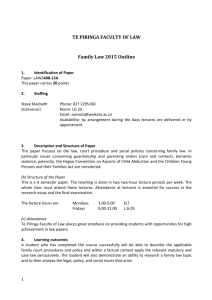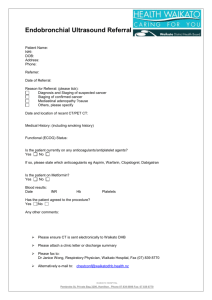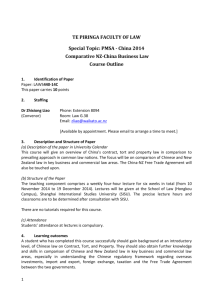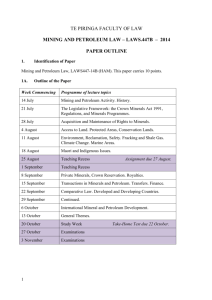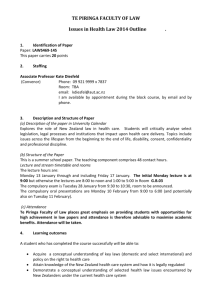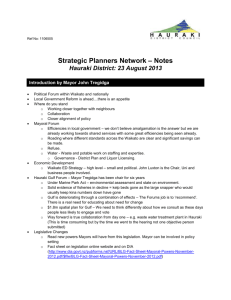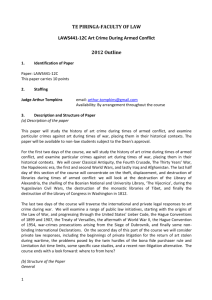LAWS458-15B Advocacy - The University of Waikato
advertisement
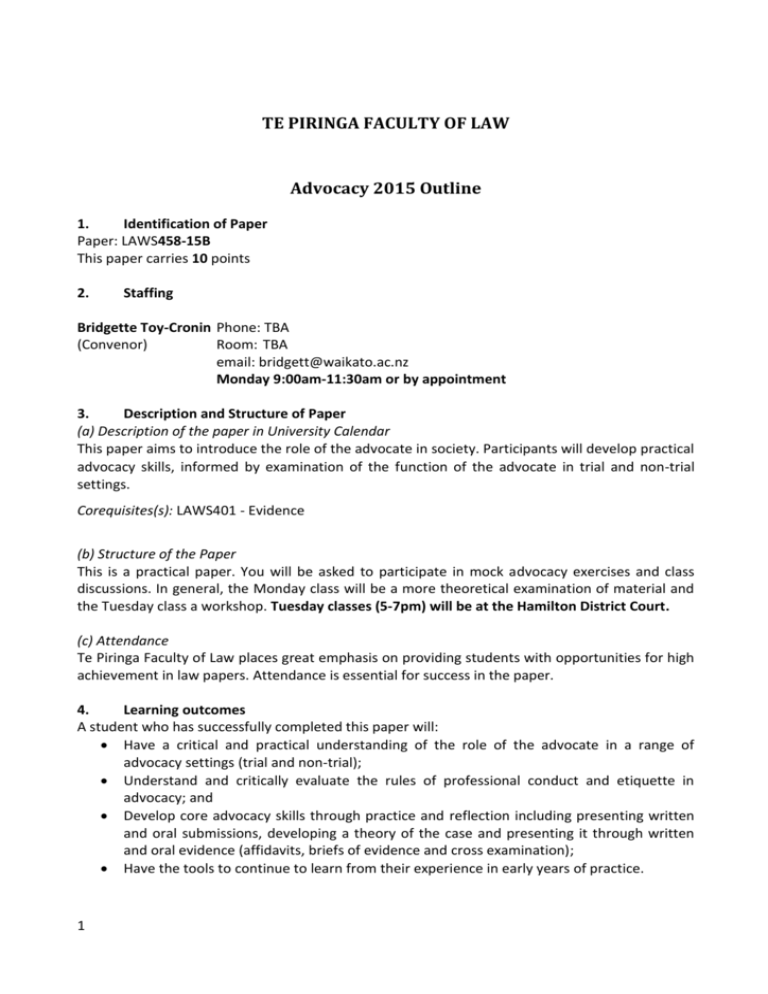
TE PIRINGA FACULTY OF LAW Advocacy 2015 Outline 1. Identification of Paper Paper: LAWS458-15B This paper carries 10 points 2. Staffing Bridgette Toy-Cronin Phone: TBA (Convenor) Room: TBA email: bridgett@waikato.ac.nz Monday 9:00am-11:30am or by appointment 3. Description and Structure of Paper (a) Description of the paper in University Calendar This paper aims to introduce the role of the advocate in society. Participants will develop practical advocacy skills, informed by examination of the function of the advocate in trial and non-trial settings. Corequisites(s): LAWS401 - Evidence (b) Structure of the Paper This is a practical paper. You will be asked to participate in mock advocacy exercises and class discussions. In general, the Monday class will be a more theoretical examination of material and the Tuesday class a workshop. Tuesday classes (5-7pm) will be at the Hamilton District Court. (c) Attendance Te Piringa Faculty of Law places great emphasis on providing students with opportunities for high achievement in law papers. Attendance is essential for success in the paper. 4. Learning outcomes A student who has successfully completed this paper will: Have a critical and practical understanding of the role of the advocate in a range of advocacy settings (trial and non-trial); Understand and critically evaluate the rules of professional conduct and etiquette in advocacy; and Develop core advocacy skills through practice and reflection including presenting written and oral submissions, developing a theory of the case and presenting it through written and oral evidence (affidavits, briefs of evidence and cross examination); Have the tools to continue to learn from their experience in early years of practice. 1 5. Workload Students should expect to spend 100 hours in total on this paper. In addition to lecture attendance, significant time will need to be spent on background and complementary reading. Students should allow for periods of more-focused research time in the preparation of assignments. 6. Required and Recommended Reading All law students are required to purchase, for use in all law papers, a copy of McLay, Murray & Orpin, New Zealand Law Style Guide, 2nd edition, Thomson Reuters (2011). This is available from Bennetts, at an approximate price of $37 including GST. In addition to the texts identified below, the Faculty of Law requires that students purchase the course materials book(s) for this paper. These are available from Waikato Print. Required Andrew Beck and others Introduction to Advocacy (2nd ed, New Zealand Law Society Continuing Legal Education, Wellington, 2014). Evidence Act 2006 Lawyers and Conveyancers Act (Lawyers: Conduct and Client Care) Rules 2008 Recommended Anthony Willy and James Rapley, Advocacy (Brookers, Wellington, 2013). Further material may be provided on the paper site on Moodle (http://elearn.waikato.ac.nz), the University of Waikato’s online learning system. Any such material is provided on the following terms: University of Waikato owns the intellectual property rights, including copyright, in and to this site, or has acquired the necessary licenses to display the material on the site. As a student of the Te Piringa Faculty of Law, you are granted a limited license to use (access, display or print a single copy) the material from the papers in which you are enrolled for the purposes of participating in the paper only, provided the information is not modified. Materials may not under any circumstances be copied, stored, distributed or provided in any form or method whatsoever to any third party. Any other use of the material is prohibited. None of the material may be otherwise reproduced, reformatted, republished or re-disseminated in any manner or form without the prior written consent of University of Waikato. To obtain such consent, please contact the Te Piringa Faculty of Law. 7. Online support Online support for this paper is provided via Moodle. 8. 2 Assessment a) Requirements for assessed work Te Piringa Faculty of Law procedures for the presentation, submission and referencing of course work are set out in the Te Piringa Faculty of Law Undergraduate Handbook @ p.33 which is available from http://www.waikato.ac.nz/law/undergraduate. Assignment resources are available online at http://www.waikato.ac.nz/law/student/ I. Moot 50% You will be provided with mooting materials, and will prepare written submission, then speak to those submissions in the Moot Court. This assessment will take place in pairs. The moot will be on a topic related to adversarial ethics, material that will be covered in class during the first weeks of the course. The written submissions are due 21 August at 5pm. Written submissions (25%) will be marked on: Identifying relevant principles of law and critical literature Applying that material to the facts Persuasive and logical presentation; Compliance with form (further guidance on form will be provided). I will send a copy of your written submissions to your opponent team before the moot. The moot will take place the week beginning 7 September 2015. There will be a sign-up sheet for times. The oral moot (25%) will be marked on: Delivery (oral presentation skills); Organisation of argument; Development of argument; Answering questions from the bench. Further detail about the topic, the format of written submissions and expectations regarding the oral presentation, will be provided. II. Court observation 10% You will observe at least 2 hours of a court hearing at the High or District Court and write a reflection on your observation of 1,000-1,500 words. The observation can take place at any time that is convenient to you and at any New Zealand High or District Court. I will provide you with guidance on how to find out when the court is sitting and a list of questions to guide your reflection. 3 III. Witnesses 30% For each assessment there will be a group of four students: two witnesses, an applicant and a defendant. You will be assigned the role of either applicant or defendant and provided with case materials. You will prepare a brief of evidence for your witness to be submitted by 5pm on 5 October 2015. During the week of 5 October 2015 you will be assigned a time to cross-examine the opposing parties witness and re-examine your own witness. You will also be required to appear as a witness for the assessment of another student pair in your class. Credit will be given for: developing a clear theory of the case a brief of evidence that includes relevant facts in support of that theory effectively cross-examining the opposing witness in a way that is not inconsistent with that theory demonstrating an understanding of the distinction between open and closed questions and using each correctly adopting correct court protocols raising and responding to objections interaction with the Judge. Learning Journal 10% An important aspect of this course is reflecting on your own practice as a tool for learning. You will be required to keep a Learning Journal throughout the course. Information about the expected format of the journal and questions to guide your reflections will be provided. You are required to submit six journal entries of 300-400 words per entry by 16 October 2015 at 5 pm. b) Coursework: 100% c) Assessment Components Component Percentage of Due date overall mark Moot – written submissions 25% Friday 21 August 2015 at 5pm Court observation and reflection 10% Monday 7 September 2015 at 5pm Moot – oral submissions 25% Week of 7 September 2015, times TBA Brief of evidence 15% Monday 5 October 2015 at 5pm Cross examination 15% Week of 5 October 2015, times TBA Reflective journal 10% Friday 16 October 2015 at 5pm 4 d) Handing in, marking time and collection All assignments must be submitted electronically through Moodle (http://elearn.waikato.ac.nz). See Te Piringa Faculty of Law Undergraduate Handbook, available at http://www.waikato.ac.nz/law/undergraduate. It is the policy of Te Piringa Faculty of Law to return marked work to students within five weeks of submission. If you require assistance with Moodle, or encounter any problems, please contact the Help Desk. You can send a message to Help Desk by using the instant message service in your paper (from the participants list within the People block). Alternatively, you can email them directly at help@waikato.ac.nz or call 838 4008. e) Measurement of Achievement Achievement in examinations and tests will be measured primarily in terms of levels of understanding and knowledge gained. Achievement in assignments will be measured also in terms of fluency and accuracy of expression and referencing. Major deficiencies in structure, style, grammar and spelling will result in lower marks. f) Management of assessment deadlines, process for requesting extensions and special consideration, and for appeals (i) Extensions Students are required to complete and submit all internal assessments by specified dates. The meeting of deadlines is a mark of professionalism and its enforcement is essential for fairness to all students taking the paper. Handing in course work on or before the due date also facilitates the timely return of marked work by academic staff. Students should meet requirements as to time deadlines for course work, or make a request for an extension or special consideration in appropriate circumstances (see Undergraduate Programmes Manual available from the School of Law Undergraduate website http://www.waikato.ac.nz/law/undergraduate/). Failure to comply with requirements as to the time deadlines for internal assessment without having successfully applied either for an extension or special consideration with supporting evidence before the due date will result in deduction of 2.5 marks for each day the work is late. Lateness of more than a week may result in the work not being marked. No deadlines may be extended beyond two weeks after the last teaching day of the semester(s) in which the paper is taught as final grades must go to the Board of Examiners at this time. Unless an extension in writing has been granted, a lecturer may refuse to accept a piece of work which is submitted after the specified date, and automatically award it no mark, or may lower the mark as a penalty for lateness. Applications for extension, on the form obtainable from the Law Reception, must be submitted to the Chief Examiner or nominee. Students should not submit the extension form to the lecturer, nor should students seek extensions from the lecturer via other forms of communication. Extensions will be granted only on evidence of illness, family bereavement, or serious personal accidents or circumstances. Please note that too many assignments due at the same time is NOT an acceptable reason, neither are claims that computers and/or printers have crashed. Account will be taken of the time in which the student has had to complete the internal assessment before the intervening event occurred. It will be important to consider if the grant of the extension will 5 give the student in question an unfair advantage over other students. A maximum period of 14 days will be given as an extension unless there are exceptional circumstances. In determining applications the Chief Examiner or nominee may consult with the Convenor or lecturer of the relevant paper. When the Chief Examiner or nominee has made a decision on the application for extension, the nominated Administrative Assistant will advise the student of the decision by email. Following this, the extension form will be given to the relevant lecturer who will retain it until after the assignment is marked and returned to students. The form will then be placed on the student’s file. It should be noted that if an extension of longer than 14 days is granted, the assignment will not be automatically printed out and delivered to the lecturer, therefore the lecturer is responsible for ensuring the assignment is printed. In appropriate cases, when a student’s application for extension is declined the Chief Examiner or nominee will inform the student of the process for applying for special consideration. ii) Special Consideration The Assessment Regulations 2005 as set out in the University Calendar 2015 list in detail the university-wide policies and procedures, which apply concerning missed examinations, impaired performance or impaired preparation time for an examination, and missed or impaired course work. Students are responsible for ensuring that they comply with these regulations. Application forms for special consideration for internal assessment are available from law reception. iii) Appeals (University Calendar 2015, Assessment Regulations 2005, Reg. 24) A student may appeal against any decision taken under these regulations. An appeal, comprising a written statement of the circumstances of the appeal, together with supporting evidence if available, must be submitted by the student in writing to the Head of Student & Academic Services not more than seven days after the date on which notification of the relevant decision is received. Appeals under this section are considered and decided by the Deputy Vice-Chancellor by delegated authority of the Education Committee. A decision by the Deputy Vice-Chancellor is notified in writing, and is final. iv) No electronic devices are allowed in any internal tests or exams. v) If you wish to submit your Internal Assessment in Māori, you need to obtain an application form from the Law Reception at least 14 days before the assessment is due. vi) If you wish to apply to write your official exams in Māori, you need to complete the official application form from the University’s Assessment Office. (refer to the Policy on the Use of Māori for Assessment in the University Calendar) 9. University Calendar Regulations and Policies Your attention is drawn to the following regulations and policies, which are published in the University Calendar 2015: Assessment Regulations 2005 Student Discipline Regulations 2014 6 Computer Systems Regulations 2005 Policy on the Use of Māori for Assessment Student Research Regulations 2008 Ethical Conduct in Human Research and Related Activities Regulations 2008. 10. Links to other papers You must also be enrolled in, or have already passed, LAWS401-Evidence. 11. Fees Refer to http://calendar.waikato.ac.nz/admission/tableoffeesandcharges.html. 12. Referencing guidelines and caution against plagiarism (a) Referencing must be in accordance with the New Zealand Law Style Guide (2nd Ed) Thomson Reuters 2011. (b) All written work submitted for the purposes of assessment must be your own work. Copying or paraphrasing all or part of another person’s work, be it published or unpublished, without clear attribution, is plagiarism. Plagiarism is misconduct and is dealt with under the disciplinary procedures of the University as outlined in the Student Discipline Regulations 2014 in the University Calendar. “Plagiarism means presenting as one’s own work the work of another, and includes the copying or paraphrasing of another person’s work in an assessment item without acknowledging it as the other person’s work through full and accurate referencing; it applies to assessment presented through a written, spoken, electronic, broadcasting, visual, performance or other medium.” See section 3, Assessment Regulations (2015 Calendar) (c) The Te Piringa Faculty of Law’s policy regarding plagiarism is Te Piringa Faculty of Law Undergraduate Programmes Manual, available from: http://www.waikato.ac.nz/law/undergraduate/. 13. Health and safety The Law School’s Health and Safety representative is to be advised, please report any incident to the Law Reception - Room Law G.44 or call ext 4167. 14. Class representation Contact details for the Student Representation Coordinator, Academic Services Division, are as follows: Jeanie Richards, Student Services, ext. 8221, email: student.reps@waikato.ac.nz. 15. Complaints procedures The brochure Student Concerns and Complaints Policy provides details of the University’s process for handling concerns and complaints and is available from Faculty and School Offices, The Gateway and Student Services Division and is contained in the Calendar 2015. See also the document Student Support Structure at Te Piringa Faculty of Law, available from law reception. 7 Lecture Schedule B semester Week Commencing Programme of lecture topics 13 July (Semester B Starts) Introduction Voice workshop 20 July Role of the Advocate I Etiquette and conduct workshop 27 July Role of the Advocate II Advocacy & ethics – pleas in mitigation 3 August Writing submissions Advocacy & ethics - adjournment application 10 August Writing submissions Written submissions - workshop 17 August Adjusting your opponents style – forum and Replying to questions from the bench 24 August Teaching Recess 31 August Teaching Recess 7 September Moot assessment Moot assessment 14 September (17 September Kingitanga Day) Theory of the case & briefing witnesses Writing affidavits/briefs of evidence – workshop 21 September Examining witnesses Cross-examination workshop 28 September Examining witnesses Objections and exhibits workshop 5 October Witness examinations assessment Witness examination assessment 8 12 October Learning after law school; tips for new players Advocacy careers 19 October Study Week 26 October (26 October Labour Day) Examinations 2 November Examinations 9


